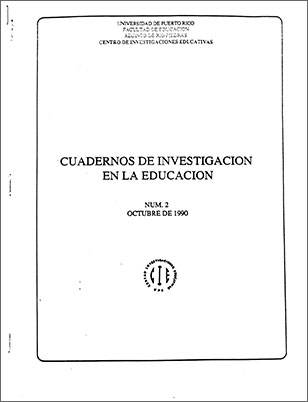Resumen
Cómo citar:
Caraballo, J. N. (1990). La síntesis de investigaciones a través del meta-análisis. Cuaderno de Investigación en la Educación, 2, 3- 11. Recuperado a partir de https://revistas.upr.edu/index.php/educacion/article/view/16353
Citas
Campbell, D.T. y J.S. Stanley (1963). Experimental and Quasi-experimental Designs in Education. Chicago: Rand McNally.
Carlberg, C.G., D.W. Johnson, R. Johnson, G. Maruyama, K. Kavale, C.C. Kulik, R.S. Lysakowsi, S.W. Pflaum y H.J. Walberg (1984). Meta-analysis in education: How it has been used? Educational Researcher, 13(8), 6-15.
Cochran, W.G. (1937). Problems arising in the analysis of a series of similar experiments. Journal of the Roval Statistical Society (suplemento), 4, 102- 118.
Cooper, H.M. y R. Rosenthal (1980). Statistical vs. traditional procedures for summarizing research findings. Psycholoical Bulletin, 87, 442-449.
Fisher, R.A. (1932). Statistical methods for researh workers (4ta. ed.). London: Oliver and Boyd.
Gianconia, R.M. y L.V. Hedges (1982). Identifying features of effective open education. Review of Educational Research, 52(4), 579-602.
Glass, G.V. (1976). Primary, secondary, and meta-analysis of research. Educational Researcher, 5, 3-8.
Glass, G.V., B. McGaw y M.L. Smith (1981). Meta-analysis in social research. Beverly Hills, CA: Sage.
Guskey, T.R. y S.L. Gates (1986). Synthesis of research on the effects of mastery learning in elementary and secondary classrooms. Educational Leadership, 43(8), 73-80.
Hedges, L.V. (1984). Estimation of effect size under nonrandom sampling: The effects of censoring studies yielding statistically insignificant mean differences. Journal of Educational Statistics. 9(1), 61-85.
Hedges, L.V. (1985). Issues in meta-analysis. Review of Research in Education, 13, 353- 396.
Hedges, L.V., J.A. Shymansky y G. Woodworth (1989). Modern methods of meta- analysis. Washington, DC: National Science Teachers Association.
Hedges, L.V. e I. Olkin (1985). Statistical methods for meta-analysis. Orlando, Fla.: Academic Press.
Kulik, J.A., C.C. Kulik y P.A. Cohen (1980). Effectiveness of computer-based college teaching: A meta-analysis of findings. Review of Educational Research, 50, 525-544.
Pearson, K. (1933). On a method for determining wether a sample of given size n supposed to be drawn from a parent population having known probability integral has probability drawn at random. Biometrika, 25, 379-410.
Slavin, R.E. (1984). Meta-analysis in education: How it has been used? Educational Researcher, 13, 6-15.
Slavin, R.E. (1984). A rejoinder to Carlberg et. al. Educational Researcher, 13(8), 24-27.
Slavin, R.E. (1986). Best-evidence synthesis: An alternative to meta-analytical and traditional research. Educational Researcher, 15(9), 5-11.
Slavin, R.E. (1987). Best-evidence synthesis: Why less is more. Educational Researcher, 16(4), 15-16.
Tippet, L.C.H. (1931). The method of statistics. London: Williams and Norgate.
Walberg, H.J. (1984). Meta-analysis in education: A reply to Slavin. Educational Researcher, 13(8), 16-23.
Wolf, F.M. (1986). Meta-analisis: Quantitative methods for research synthesis. Beverly Hills, CA: Sage.
Yates, F. y W.G. Cochran (1938). The analysis of groups of experiments. Journal o f Agricultural Science, 28, 556-580.
El contenido que aparece en la Revista de Educación de Puerto Rico se distribuye gratuitamente y está disponible bajo las prácticas de acceso abierto, de acuerdo con la licencia de Creative Commons, Atribución-NoComercial 4.0 Internacional (CC BY-NC 4.0). Mediante estos principios, la revista y sus autores permiten a los lectores acceder, reproducir y compartir los textos completos de los artículos. Los usuarios deben dar crédito a los autores de forma razonable sin sugerir que tienen el apoyo de ellos. Bajo ninguna circunstancia, los lectores pueden hacer uso de los contenidos con propósitos comerciales. Los autores conservan los derechos de autor sobre sus trabajos.

